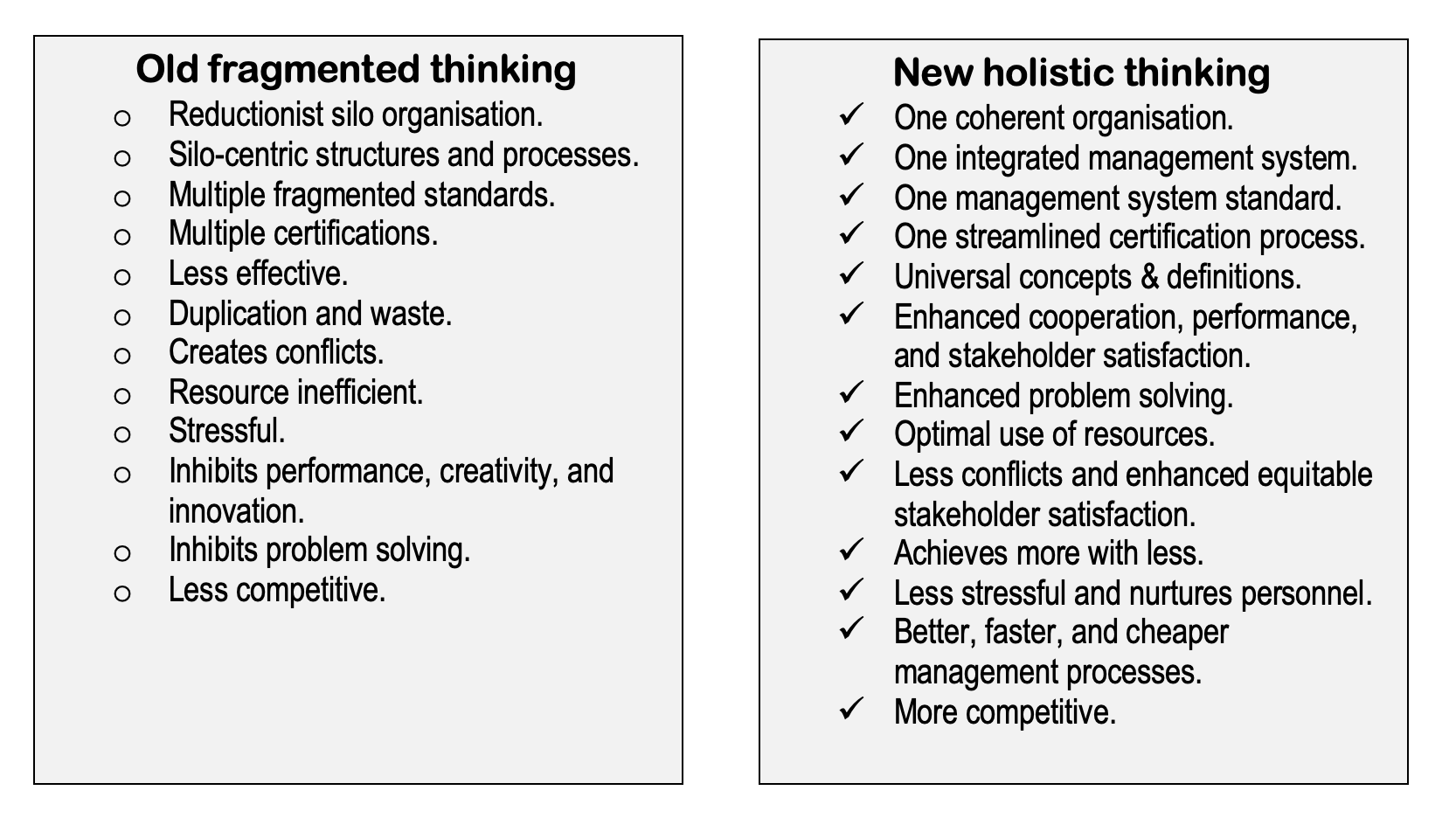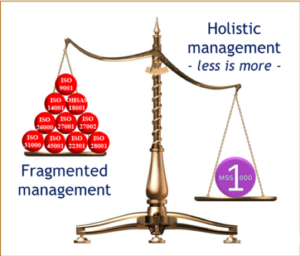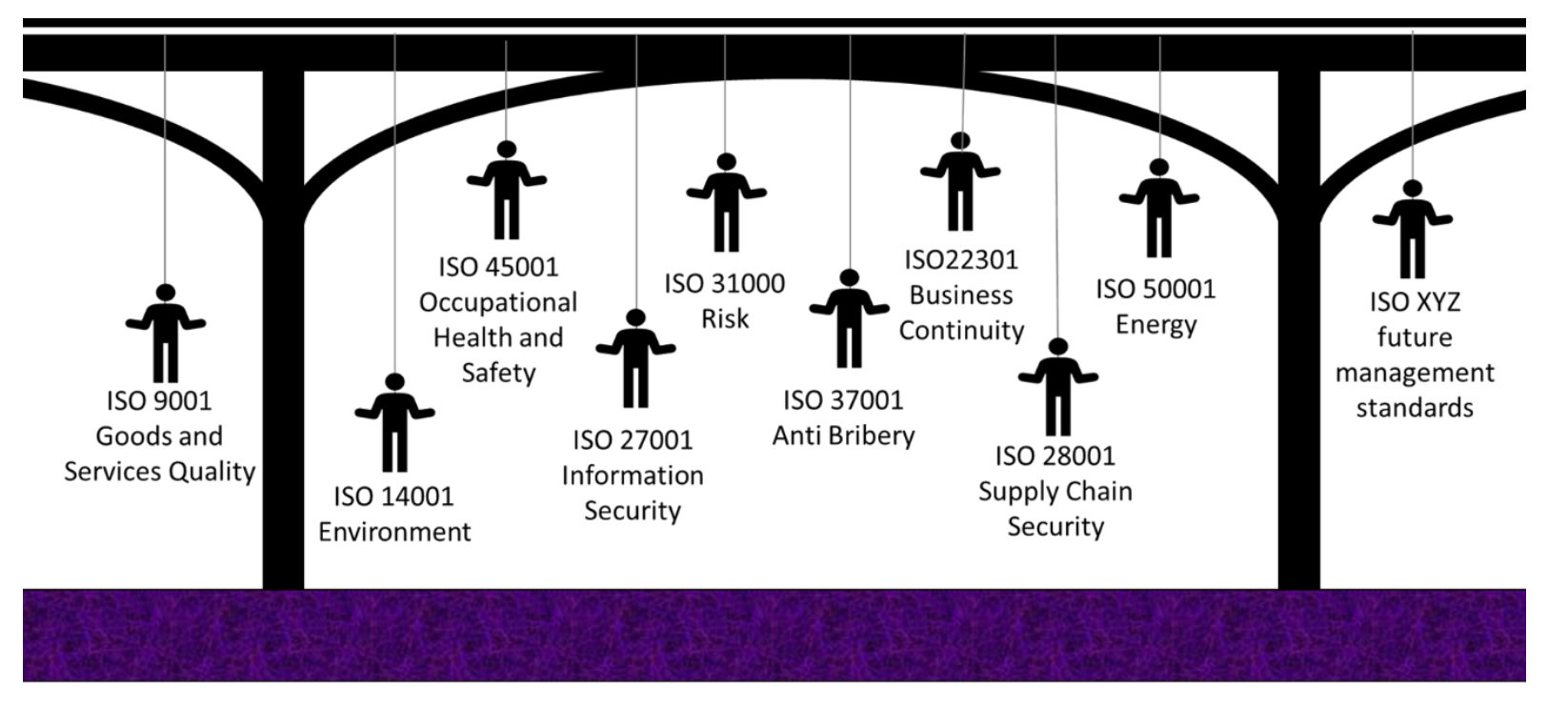 This article provides insights into why the International Organisation for Standardization (ISO) strategy for management systems standards over the last two decades has failed to meet the needs of organisations. It is producing standards that are not fit for purpose and misaligned with the needs, expectations and aspirations of its customers and other stakeholders and is negatively impacting economic, social and ecological performance.
This article provides insights into why the International Organisation for Standardization (ISO) strategy for management systems standards over the last two decades has failed to meet the needs of organisations. It is producing standards that are not fit for purpose and misaligned with the needs, expectations and aspirations of its customers and other stakeholders and is negatively impacting economic, social and ecological performance.
Bungees at the BSI Conference
The British Standards Institution (BSI) Spring Standards Conference titled ‘Making connections for a better world’ was reportedly held in London on 25th May. Its stated objective was to connect with professionals from across sectors to explore key themes of People, Planet, and Digitalisation and how they intersect, and to learn how you can help shape a better, more sustainable future through standards.
It was reported on CQI LinkedIn that discussions included bungee jumping but no information is available on the context. It is not known whether Integrated Management Systems or universal management system standards were discussed. Are not the intersections of ‘People, Planet, and Digitalisation just as, or even more important than the separate elements? Are not the big problems of today because we fail to join the dots of the big picture? The solution to the conference objective would have been significantly aided by a universal full scope management system standards like MSS 1000 and not the continued proliferation of ISO fragmented bungee management standards.
Interestingly, COVID interrupted ISO 9001’s regular bungee jump. However, a massive mega container of complaints by organisations was conspicuous by its absence. Organisations were spared the burden of modifying their management systems, internal awareness training and recertification avoiding disruption and avoidable waste of management resource. Arguably this was the greatest contribution of ISO9001 in managing the pandemic.
The ISO standards reflect an ignorance that each facet of performance does not need its own management system although we need specialists who understand the myriad of potential ways stakeholders and the world can be impacted, and able to competently design appropriate prospect and risk controls. Why do so many fail to understand that these multiple positive and negative stakeholder impacts all emerge from the same core structures and processes established by the organisation to deliver its goods and/or services to fulfil its purpose. Organisations directly manage their aspects but only indirectly their stakeholder impacts. Any potential change to an organisation aspect may change multiple impacts across the stakeholder impact spectrum including personnel, product/service quality, health, safety, environment, security, finance etc. This strange notion of needing multiple management systems covering every dimension of performance has been repeatedly demonstrated to be false by many thousands of enlightened organisations who have successfully been operating integrated management systems over the last couple of decades.
Holistic universal management system standards
 The concept of a single universal management system standard was defined in a formal proposal by the Integrated Management Community (IMC) to the CQI CEO and formally approved in 2011. Following a 3-year research and development program by an international team of experts it was completed in 2014. However, following lobbying by the CQI’s own pro ISO9001 standards committee and the growing ISO 9001 CQI involvement, the CQI withdrew its support for MSS 1000. However, in the public interest and in compliance with the CQI Royal Charter MSS 1000 was published anyway by the IMC and free to download globally.
The concept of a single universal management system standard was defined in a formal proposal by the Integrated Management Community (IMC) to the CQI CEO and formally approved in 2011. Following a 3-year research and development program by an international team of experts it was completed in 2014. However, following lobbying by the CQI’s own pro ISO9001 standards committee and the growing ISO 9001 CQI involvement, the CQI withdrew its support for MSS 1000. However, in the public interest and in compliance with the CQI Royal Charter MSS 1000 was published anyway by the IMC and free to download globally.
MSS 1000 not only was able to replace existing ISO management system standards but also include topics such as HR not covered by ISO managemnt system standards.
MSS 1000 was also able to include advanced functionality such as: single document one-stop requirements and guidance written in the language of business, free to download, universal boundless application, choice of qualitative and quantitative compliance, bronze-silver-gold compliance levels, stakeholder prospect and risk focus, overt and covert management arrangements, readily navigable via hyperlinks and index, comprehensive universal definitions, and directly interfaceable with IT applications license free.
ISO follies
The proliferating fragmented ISO management system standards can be likened to a row of bungees that every time they come up, they are different to when they went down. And of course, every upward stroke opens opportunities for making dosh. It’s not so much ‘not right first time’ but ‘cash every time’.
Even before 1996, when the ISO 9001 existed on its own as a quality management system standard, it suffered from bungeeness. ISO failed to get it right first time, and the standard is not even stable two and a half decades later!
 1996 is when ISO went down an anti-holistic management path facilitating silo committees empowered to create standalone management system standards each focusing on a narrow-bounded facet of performance. ISO 14001 addressing environmental performance was the first in 1996, but many others were to follow each aiding a massive global certification industry. All that ISO needed to have done was to have extended the scope of ISO 9001 to include environmental impacts etc. and have avoided the proliferation of multiple fragmented ISO management system standards. This ISO strategic blunder was arguably one of the greatest management follies of the nineteenth century creating a growing disastrous legacy extending to the current day. Even attempts to mitigate its impacts such as the ISO Annex SL taxonomy were good in principle. However, Annex SL was still ill conceived, non-holistic and an incomplete management topic taxonomy. Subsequently, reformatted ISO management system standards needed appendices containing all the non-fitting leftovers. It has resulted in an uncontrollable monster.
1996 is when ISO went down an anti-holistic management path facilitating silo committees empowered to create standalone management system standards each focusing on a narrow-bounded facet of performance. ISO 14001 addressing environmental performance was the first in 1996, but many others were to follow each aiding a massive global certification industry. All that ISO needed to have done was to have extended the scope of ISO 9001 to include environmental impacts etc. and have avoided the proliferation of multiple fragmented ISO management system standards. This ISO strategic blunder was arguably one of the greatest management follies of the nineteenth century creating a growing disastrous legacy extending to the current day. Even attempts to mitigate its impacts such as the ISO Annex SL taxonomy were good in principle. However, Annex SL was still ill conceived, non-holistic and an incomplete management topic taxonomy. Subsequently, reformatted ISO management system standards needed appendices containing all the non-fitting leftovers. It has resulted in an uncontrollable monster.
In this modern management system standards world ‘Quality Management’ is synonymous with ‘Bungee Management’ turning the teaching of classic quality wisdom on its head. The tentacles of this corrupt and damaging mode of thinking reached into our education, training and professional bodies and has become entrenched. Since the turn of the millennium enlightened commercial organisations have been implementing integrated management systems and have been becoming frustrated with the management system standards and certification industry ignoring its needs. The ISO products structure is so clearly not fit for purpose to companies charged with delivering quality goods and services while equitably satisfying stakeholders’ diverse requirements. The ISO management system standards will not secure the future of humankind simply because the architecture is non-holistic, incomplete and impedes joined-up thinking management processes.
True management principles are boundless and universal
We live in a world governed by universal laws of nature which apply throughout the cosmos and have done so since the Big Bang. These laws and principles governing the cause and effects also apply to the conduct of management. The principles of effective and efficient management are eternal transcending space and time. This is true even if we don’t necessarily fully understand them or understand how to apply them in every given circumstance. The principles are universal and unbounded although their application depends on the circumstances and may even be bespoke.
However, ISO believes and promotes the notion of a world where management principles and best practice is constantly fluid and evolving. It uses this perception to excuse never getting managemnt system standards right first time and justifying the bungee continual review and change cycles.
ISO standards practitioners often justify the need for constantly evolving management system standards because the world is changing, and the standards must follow. This is illogical because the ISO management system standards may be applied to any organisation large or small around the globe. These organisations vary considerably in sophistication and maturity. There really is no logical argument for the standards having to be continually changed apart from the repeated incompetence to get them right first time. Organisations of the world become a laboratory for ISO management practice!
Need to emerge from the dark age of management thinking
In the modern world organisations do not have the luxury to pick and mix their obligations. They have legal and moral duty to address all potential stakeholder impacts and only a holistic approach presents any chance of successfully managing this complicated interwoven task to equitably satisfy stakeholders needs, expectations and aspirations while making the best use of resources – the foundation principle of integrated management.
The current illogical ISO fragmented proliferating bungee standards do not optimally serve the needs of any type or size of organisation. Organisations left to their own instinctive management would inherently be free of bungee management behaviour but is projected into them like an ISO virus. We need a paradigm shift to a truly holistic approach to management which is able to address the huge global challenges that we are currently facing.
 This paradigm shift must be promoted by strong enlightened leadership and promulgated throughout all aspects of governance and management. It must seamlessly integrate strategy, tactics, and operations, and embrace fully integrated boundless management systems. All personnel must be appropriately competent in integrated thinking and management to fulfil their roles through comprehensive education and training.
This paradigm shift must be promoted by strong enlightened leadership and promulgated throughout all aspects of governance and management. It must seamlessly integrate strategy, tactics, and operations, and embrace fully integrated boundless management systems. All personnel must be appropriately competent in integrated thinking and management to fulfil their roles through comprehensive education and training.
 Back to first principles and integrity
Back to first principles and integrity
ISO doggedly maintains a behaviour of preaching, promoting, and providing tools for non-holistic management which is clearly unfit for the challenges of our time. ISO has become a problem rather than the provider of solutions. This is because its’ thinking does not align with the actual world of wealth creation and retention which is optimally orchestrated via a single coherent set of structure and process. ISO continues with its cyclic fragmented silo-centric ritual dances oblivious to the needs of organisations and the way they have progressively moved towards more holistic management approaches over the last two decades. This has seriously hampered the application of joined up governance and management thinking needed to tackle the world’s pressing economic, social, and ecological problems.
We urgently need to get back to logical valid first principles, remove the snake oil, and eradicate the self-serving restrictive practices that are damaging organisation’s performance and the global economies. We need to become truly stakeholder centric, to be able to be able to honestly claim to be professionals with integrity.
Root and branch change will need to take place in all our institutions led and promoted by industrial and political leaders. Integrated management education, training and practice must be based on valid first principles, free of snake oil, commercial bias, self-serving interests, and restrictive practices. It is time for stakeholders to assert their influence – they have been deprived of the proven benefits of integrated management for far too long. The future should be driven by constructive, equitable and responsible stakeholder power. It is time for ISO and its colluding certification bodies to stop wagging the dog and behave responsibly.
We live in a time that cries out for the serving of the greater good – not only for moral reasons but because it is optimal the optimal behaviour of our social species. We must put away foolish things and transcend our self-serving bungee silo behaviours. We need a steady at the helm integrated approach to governance and management from everyone in a key position of power and influence.
Everyone is welcome to participate in the Integrated Management Community (IMC).
BIO:
Ian Dalling is a retired Integrated Management Consultant and Director of ‘Unified Management Solutions’, that specialised in integrated approaches to management. He is a Chartered Mechanical and Electrical Engineer, a fellow of the Chartered Quality Institute, a fellow of the International Institute of Safety and Risk Management. He holds degrees in engineering and physics. He is the current chair of the global Integrated Management Community (IMC).
Ian’s career commenced in 1962 working for the United Kingdom Central Electricity Generating Board in various posts within nuclear power plants embracing operations, commissioning, planning, management services, quality management. In 1989 he moved to the United Kingdom Atomic Energy Authority (UKAEA) Safety and Reliability Directorate (SRD) as a risk management analyst and consultant.
His career has spanned the design, construction, commissioning, operation, and decommissioning of conventional and nuclear power plants, as well as providing a wide range of quality/risk management consultancy in other major hazard industries including oil and gas, electrical power distribution, rail, construction, and medical devices. He started his own management consultancy in 1999 delivering services for clients in the UK and internationally in Eastern Europe, India, and China for national and international bodies. He chaired the Chartered Quality Institute Integrated Management Special Interest Group from 2007 until 2020 when it evolved into the Integrated Management Community IMC. Ian led the international team that created the world’s first universal management system standard without boundaries (MSS 1000). He has published many integrated management papers and articles and presented at international conferences.
The following is a selection of some of his past roles:
- Leading operational planning team during the construction and commissioning of an Advanced Gas Cooled Reactor nuclear power plant.
- European Notified Body Quality Manager certifying machinery and medical devices under European Product Directives.
- Serving on the European Process Safety Committee, and the British Standards steering committee for BS 8800, a guide on the management of occupational health and safety.
- Leading a team assessing the 120-year decommissioning programme for the Winfrith Steam Generating Heavy Water Reactor in the UK.
- Assessing nuclear weapons assembly and maintenance safety culture.
- Developing crisis and emergency plans for a regional electricity company.
- Member of international team that assessed the safety of the Lithuanian Ignalina RBMK nuclear power plant following the Chernobyl accident.
- Providing systems analyst support during the development of safety critical software.

